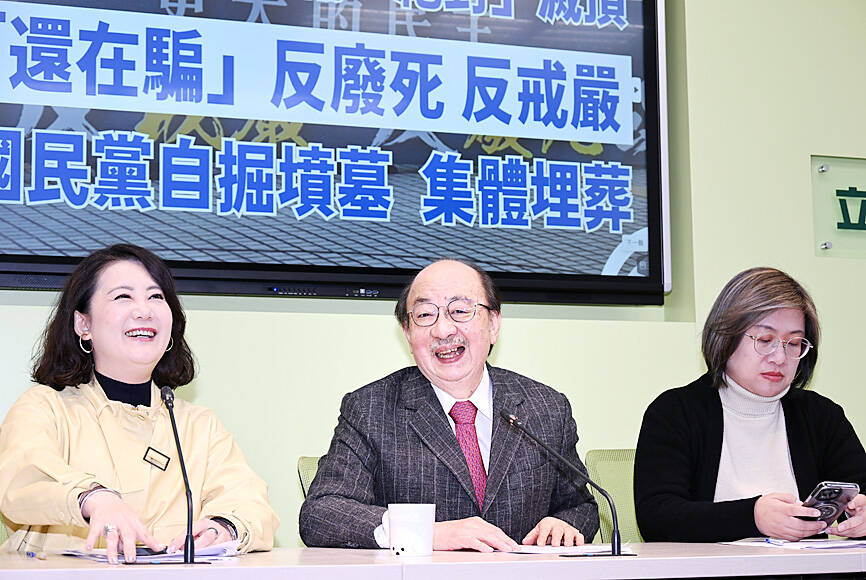The Chinese Nationalist Party’s (KMT) referendum campaigns against the abolition of the death penalty and martial law are designed to deceive the public and shift focus away from the ongoing recall movement, Democratic Progressive Party (DPP) caucus whip Ker Chien-ming (柯建銘) said yesterday.
KMT Chairman Eric Chu (朱立倫) yesterday announced that his party would launch a campaign to hold referendums opposing the abolition of the death penalty and what he said was a push toward martial law and war by the DPP.
“KMT is misleading people, saying they are fighting against martial law. Are they joking? President William Lai [賴清德] had already said Taiwan must not go back to live under martial law,” Ker told a news briefing in the legislature yesterday.

Photo: Fang Pin-chao, Taipei Times
“It is the KMT who long for the past, wishing for the return of martial law in Taiwan, but they accuse Lai of wanting to do so. KMT officials are distorting the truth and continue to try to deceive the public,” he added. The purpose “is to confuse people and shift focus away from the ongoing recall movement.”
The Constitutional Court in September last year ruled that capital punishment is valid in some murder cases, he said, adding that judicial authorities had administered the death sentence in January for a convicted murderer.
“So, it is very clear that capital punishment is still on the books, but the KMT still wants to push this referendum,” he said.
Separately, DPP spokesman Justin Wu (吳崢) said Chu last month declared that KMT legislators would focus on bills concerning people’s livelihood, economy and social welfare programs.
“But now, they are taking up efforts and resources to push for these two non-existent issues,” Wu said.
Some legal experts said the KMT’s proposals could not be valid, as the government did not abolish capital punishment or impose martial law.

A preclearance service to facilitate entry for people traveling to select airports in Japan would be available from Thursday next week to Feb. 25 at Taiwan Taoyuan International Airport, Taoyuan International Airport Corp (TIAC) said on Tuesday. The service was first made available to Taiwanese travelers throughout the winter vacation of 2024 and during the Lunar New Year holiday. In addition to flights to the Japanese cities of Hakodate, Asahikawa, Akita, Sendai, Niigata, Okayama, Takamatsu, Kumamoto and Kagoshima, the service would be available to travelers to Kobe and Oita. The service can be accessed by passengers of 15 flight routes operated by

Alain Robert, known as the "French Spider-Man," praised Alex Honnold as exceptionally well-prepared after the US climber completed a free solo ascent of Taipei 101 yesterday. Robert said Honnold's ascent of the 508m-tall skyscraper in just more than one-and-a-half hours without using safety ropes or equipment was a remarkable achievement. "This is my life," he said in an interview conducted in French, adding that he liked the feeling of being "on the edge of danger." The 63-year-old Frenchman climbed Taipei 101 using ropes in December 2004, taking about four hours to reach the top. On a one-to-10 scale of difficulty, Robert said Taipei 101

Taiwanese and US defense groups are collaborating to introduce deployable, semi-autonomous manufacturing systems for drones and components in a boost to the nation’s supply chain resilience. Taiwan’s G-Tech Optroelectronics Corp subsidiary GTOC and the US’ Aerkomm Inc on Friday announced an agreement with fellow US-based Firestorm Lab to adopt the latter’s xCell, a technology featuring 3D printers fitted in 6.1m container units. The systems enable aerial platforms and parts to be produced in high volumes from dispersed nodes capable of rapid redeployment, to minimize the risk of enemy strikes and to meet field requirements, they said. Firestorm chief technology officer Ian Muceus said

MORE FALL: An investigation into one of Xi’s key cronies, part of a broader ‘anti-corruption’ drive, indicates that he might have a deep distrust in the military, an expert said China’s latest military purge underscores systemic risks in its shift from collective leadership to sole rule under Chinese President Xi Jinping (習近平), and could disrupt its chain of command and military capabilities, a national security official said yesterday. If decisionmaking within the Chinese Communist Party has become “irrational” under one-man rule, the Taiwan Strait and the regional situation must be approached with extreme caution, given unforeseen risks, they added. The anonymous official made the remarks as China’s Central Military Commission Vice Chairman Zhang Youxia (張又俠) and Joint Staff Department Chief of Staff Liu Zhenli (劉振立) were reportedly being investigated for suspected “serious